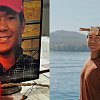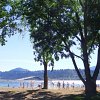It's one of the chief industries and certainly one of the foremost drivers of tourism in the Okanagan. And in January of 2024, it was tested like never before.

Beginning Jan. 11 and ending five days later, the region was walloped by one of the most crushing cold snaps on record. Daily lows regularly dropped to -20°C or below. Depending on your location, the coldest nights flirted with a face-cracking -30.
For the nearly 200 Okanagan wineries and vineyards, it was a particularly tough time.
Ultimately, 90-plus percent of all grape vines would not produce fruit in 2024. Perhaps even worse, some plants were outright killed – forcing growers to rip them out, replant, and then begin a four-year wait for them to begin producing again.
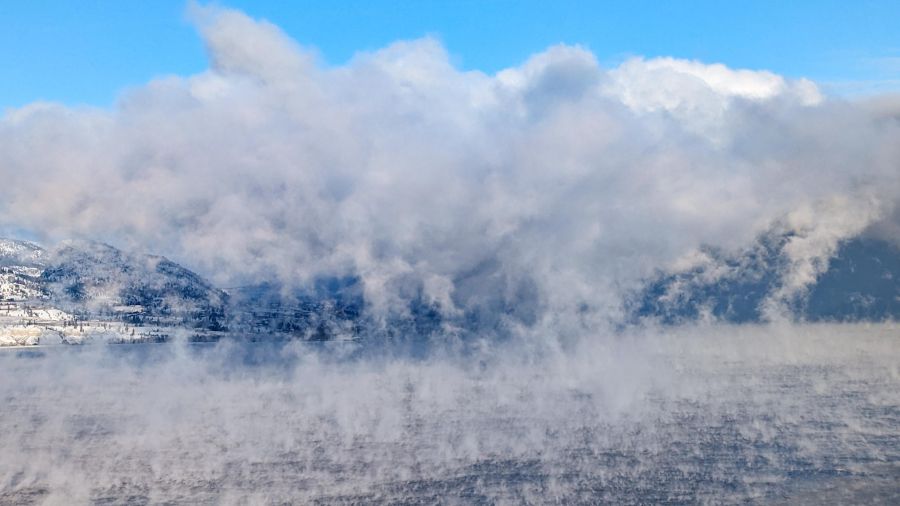
Fortunately, the outcome, as a whole, wasn't the full-on wipeout some early reports had speculated. And by the time spring rolled around, most wineries were open for business and doing what they could to move on.
But now, just a little more than a year later, the Okanagan finds itself in the midst of another notable cold snap.
Granted, there's nothing in the most recent forecast to suggest temperatures will plunge to the same levels. As of this writing, the lowest low in the coming days in -15°C.
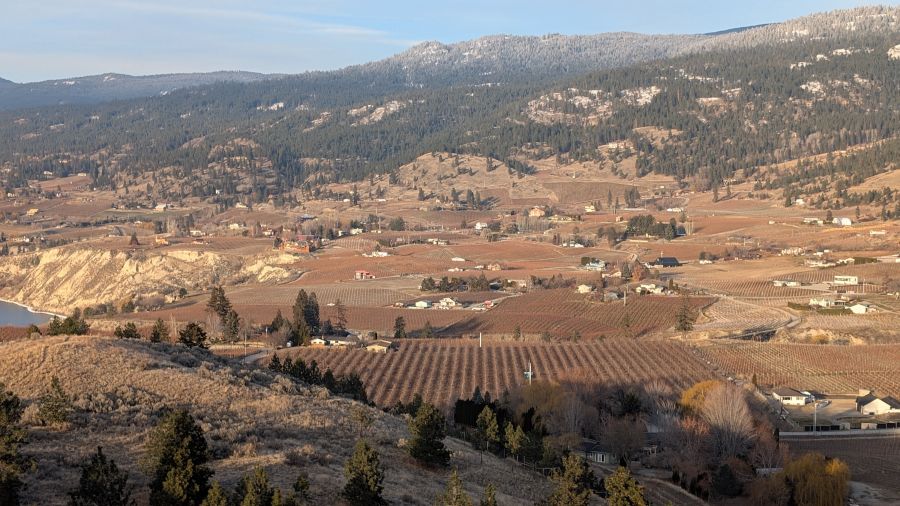
But even that's borderline. So we felt it was a good time to check in with a Penticton-area winemaker or two – or three – to find out how they’re faring.
And they responded – two from the Naramata Bench and another in the hills east of Skaha Lake.
And that's where we start.
Evan Saunders
Winemaker
Blasted Church Vineyards
Okanagan Falls
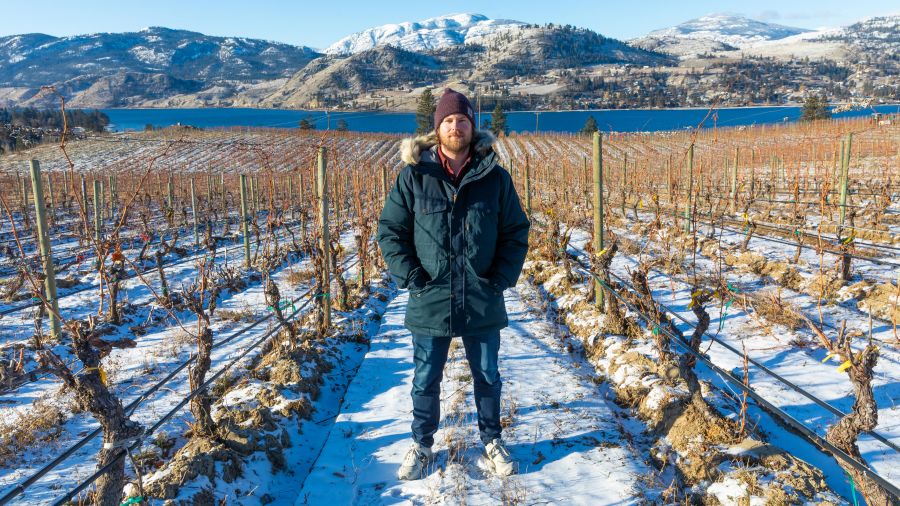
The scenic Blasted Church Vineyards, perched on a west-facing slope above Skaha Lake in northeastern Okanagan Falls, totals 70 acres. Forty of those acres are planted with grapes.
From those 40 acres, winemaker Evan Saunders and his team typically see an annual harvest of 120 to 160 tons. But in cold-impacted 2024, that figure plunged to a mere 900 kilos. That's less than a single percent of the usual return.
But Blasted Church battled more than frigid temps in 2024. It also battled a frigid temp offshoot.
"Our biggest crop last year came from Viognier Blanc," explained Saunders. "But the birds ended up taking half of it in just three days.
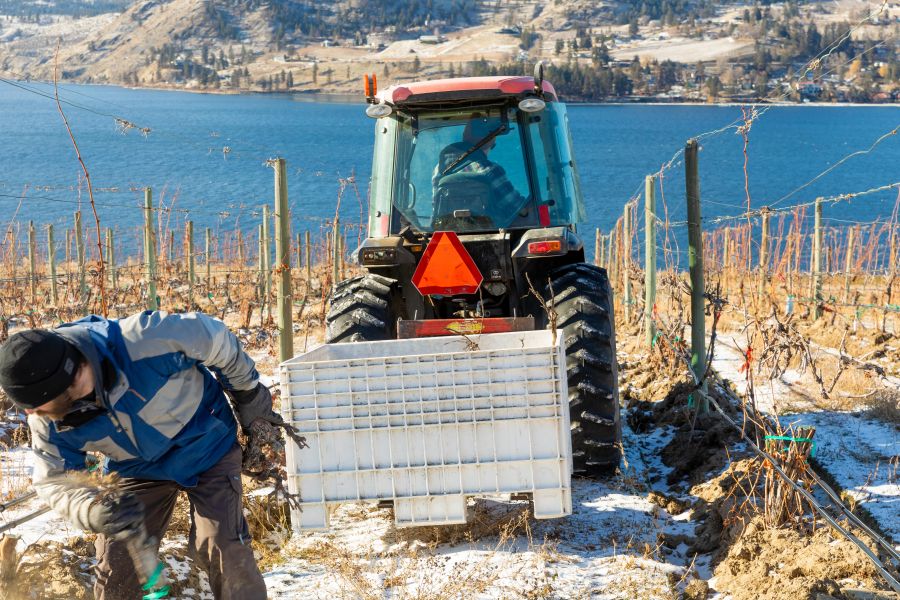
"The little bit that was out there had huge pressure from other animals too that were desperately looking for food. One day we had five bears around the outside of our property."
Beyond the scarcity of grapes, some Blasted Church plants were killed outright.
"We ripped out our Cab Sauv Blanc (Cabernet Sauvignon Blanc) because it got hit so hard by the cold," said Saunders. "That block was my favourite block of fruit, so it's really sad to see it go."
Also gone for good is the "Syrah," which Saunders says "is a really sensitive variety" and "was really hit hard everywhere." Our other interviewees agreed.
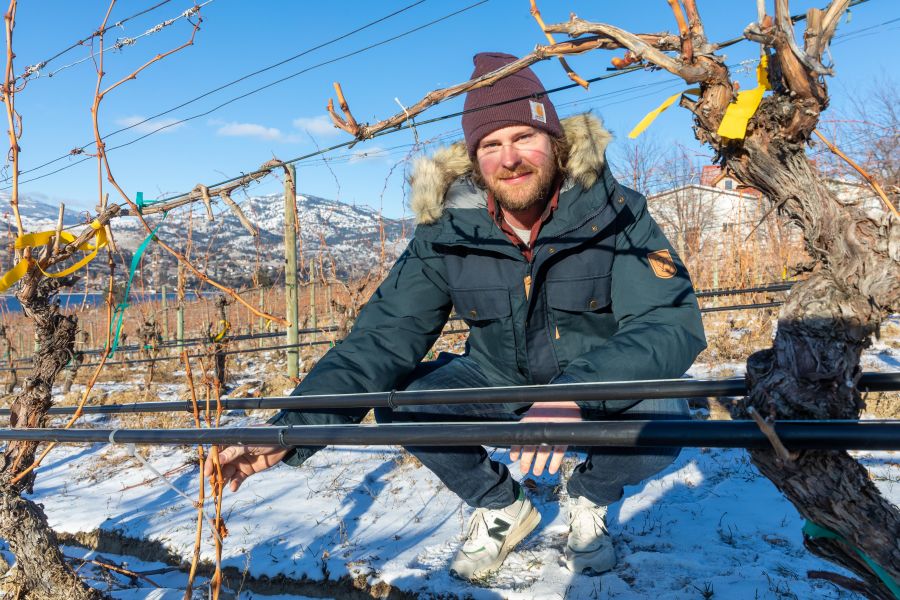
They were also forced to pull out a block of Merlot, though Saunders maintains they'll try it again and see how long it lasts this time.
In all, the vineyard lost 99-plus percent of its potential 2024 grapes and approximately 15% of its plants. But, added Saunders, it could have been worse.
"The outcome was certainly a lot better than we initially thought," he said. "We initially thought scorched earth.
"The lake wasn’t frozen though and that was a saving grace for us. I know people who are up off the lake that were minus 29, minus 30. We were minus 25, which is too cold, but others had it worse.
"Some people, their entire vineyards were killed. Get further from the lake, get on the sandy soils in Oliver and that area, or out in the Similkameen, it was scorched earth at a few places."
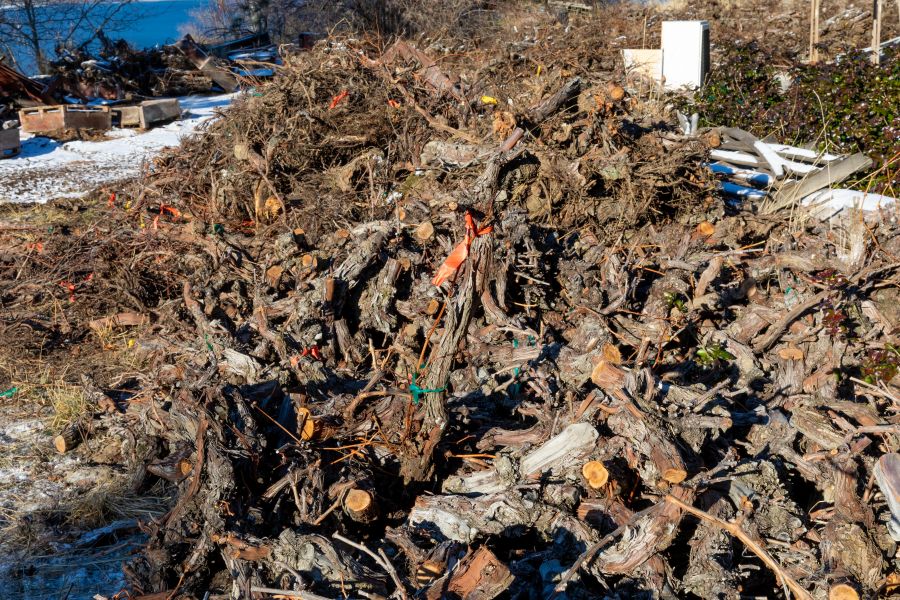
These days, Saunders, who favours the "Windy" weather app, is once again closely monitoring climatic conditions. Ultimately, even a fraction of a degree this way or that may well tell the story.
"I'm looking every couple of hours," he said. "I'm a bit less concerned today than I was a week ago when we started to see what was coming. So far we've hit minus 13. That means no problem yet.
"But at minus 15 I'll start losing sleep. At minus 16 I'm starting to get real worried. At that point, every tenth of a degree makes a difference. It's a razor's edge."
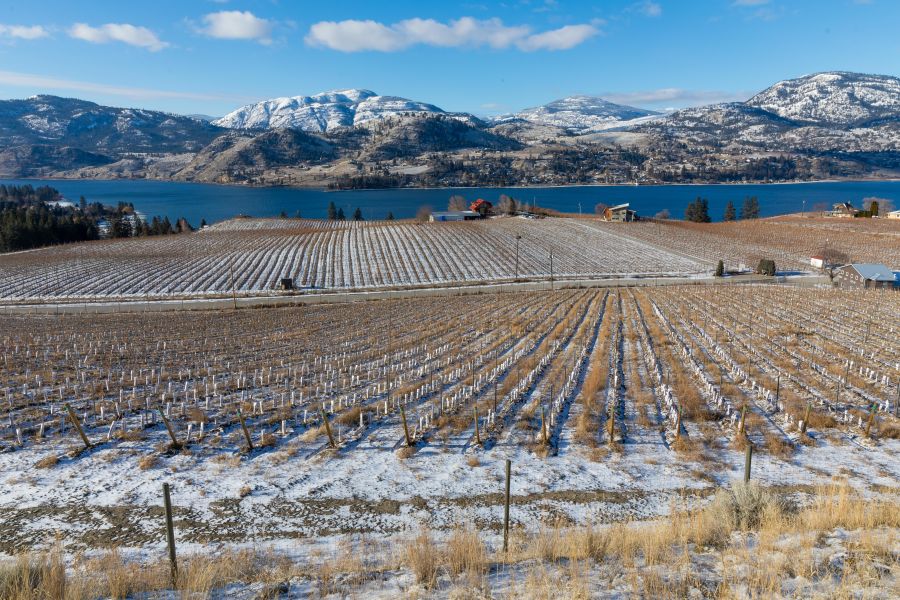
Saunders, an admitted optimist, believes they'll be okay. And some of that has to do with preparation.
Like many other wineries in the region, Blasted Church practices "hilling," a method of protecting the base and the lower buds of vines with excess dirt.
"We run a tractor down the rows and throw dirt around the base of the vines," said Saunders. "We hill up in the fall before the ground freezes, and then de-hill in the late winter or early spring once the risk of cold temperatures has passed."
They also soak their vineyard late in the year, just before the irrigation system shuts down for winter.
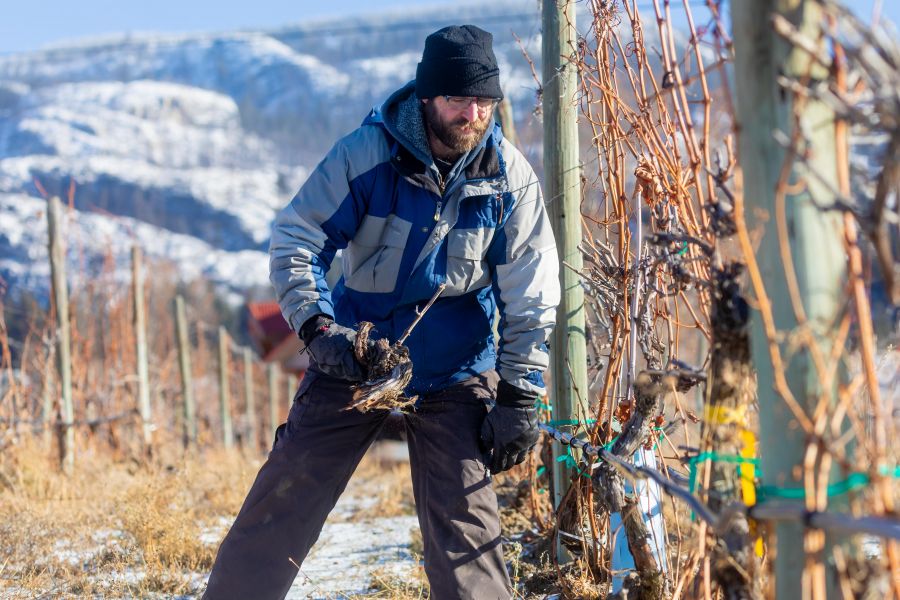
"Giving the vineyard a deep soak going into the winter months helps the vines to store carbohydrates and build up reserves to survive the cold," said Saunders. "And it helps with 'budbreak' (when buds wake from winter dormancy)."
The immediate outlook would be further improved if there was a layer of snow on the ground, added Saunders, saying any portion of the vine under a snow line will be marginally warmer and more insulated from the wind than the vine above it.
Alas, only short flurries are expected in the current cold stretch.
Going forward, Blasted Church may well explore other options should winters continue misbehaving to this level. Options like geotextiles (essentially enormous blankets that are draped over sections of the vineyard) and a concept that involves shooting warmed compressed air through irrigation lines.

"The latter would occur only during cold events to hopefully increase the ambient temperature around the vines enough to prevent bud damage and vine death," said Saunders, a believer in human-caused climate change.
But if a worst case scenario does comes to fruition during the current spate of frigid air, Blasted Church may pull a 2024 repeat and turn to their friends south of the border.
"Last year, a lot of us brought in grapes from Washington State," said Saunders. "It really helped us out at a tough time. We were able to make wine last year and we got to keep our staff employed."
However, he's keeping his eye on threatened tariffs from the Trump administration and the trade war that could result.
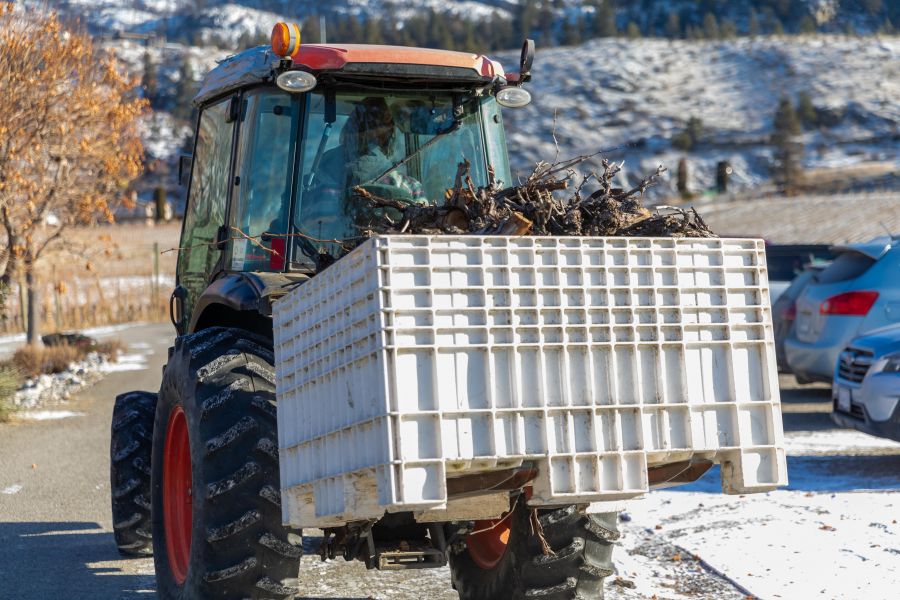
"Everything was tariff-free," he said. "Both the grape juice and the whole wine grapes. But now it's definitely a concern. Now we’re looking at how we'd import from Europe."
Ultimately, Saunders feels the newest wineries have the toughest road to hoe.
"If you got into this in the past few years," he said, "it's an incredible sequence of events you’ve had to weather. Heat domes, wildfire smoke, cold snaps, rockslides and a travel ban.
"I think some may end up in trouble. But all the ones that make it will be stronger and more resilient than ever."
Wilbert Borren
Winemaker and Co-owner
Four Shadows Vineyard and Winery
Naramata Bench
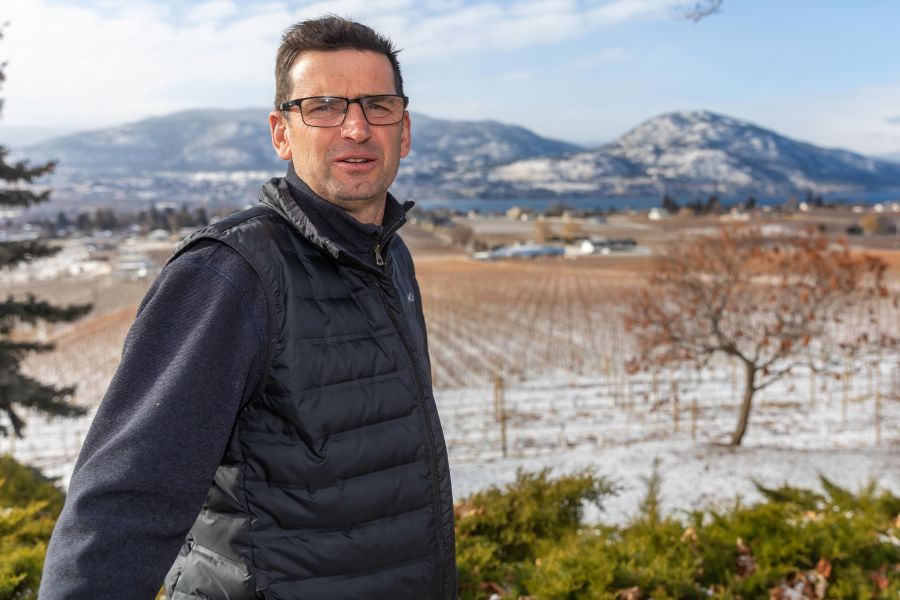
Now in its second decade of operations, Four Shadows Vineyard and Winery on the Naramata Bench certainly felt the impact of the January 2024 event.
But they didn’t feel it quite as bad as some of their closest neighbours.
"I've been a farmer for a long time," said co-owner and winemaker Wilbert Borren, who with wife Joka arrived from Alberta in 2011 to buy Mistral Estate Winery and turn it into Four Shadows.
"And with this sort of farming you’re looking at the sky all the time. But last year we came through it not too bad, considering."
Granted, "not too bad" is a relative term. Due to the January blast, Four Shadows' 13 planted acres generated virtually no fruit last year.
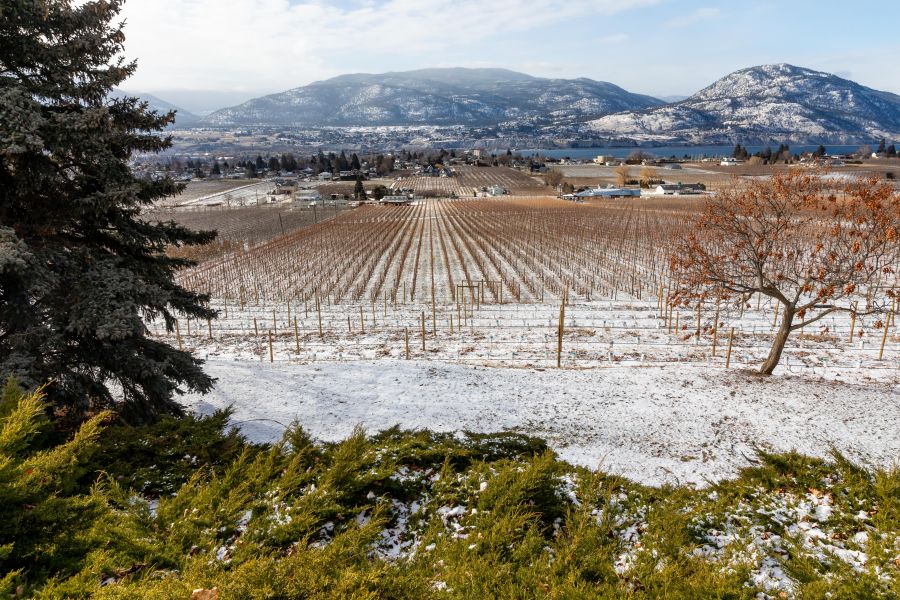
But it lost just five percent of its vines.
In fact, said Borren in a thought echoed by all our interviewees, the rest of 2024 was pretty good. Temperatures were warm but not so excessive that grapes were negatively impacted. And wildfire smoke, which can permeate fruit, was a rarity.
"Our surviving vines grew last year," he said. "Lots of growth. It was a very good summer."
Borren attributes his comparatively good fortune during the deep freeze primarily to location. And we're not necessarily talking great distances. Even a couple hundred meters can apparently make a difference.
"We have a nice slope here," he said, looking out at the stunning view over his own vineyards, numerous other vineyards, Okanagan Lake and distant mountains.
"And then it flattens out. Middle Bench (an adjacent agricultural area that essentially begins where the Four Shadows property ends) didn’t fare as well. It slopes back up a little bit as you can see.
"So that's basically a dead spot there. The cold tends to stay down there. Here we have good flow. And it was that degree or two that saved our plants."
Those plants include three reds (Merlot, Pinot Noir, and an Austrian grape called Zweigelt) and three whites (Chardonnay, Riesling, and Pinot Blanc). Mistral grew those varieties before Borren arrived on the scene 14 years ago, and he's continued with them ever since.
Like other vineyards, Four Shadows' cold weather prep includes a thorough soaking of the land in mid-fall.
"Basically the only thing we do comes after harvest at the end of September before the City turns off the irrigation water when we turn it on and fill up that soil with water," said Borren. "That helps protect against winter damage in the ground."
But that's it for preventative measures.
"Because of our location and the lay of the land," he said, "we've been fortunate that our vineyard has been spared from major vine kill."
However, there were other factors that lent a helping hand in January of 2024. Factors like snow. And low grafting.
"Yes, we were a bit fortunate," said Borren. "There was just enough snow here at the time to protect our grafts. All our plants are grafted. None of them are self-rooted. So there was snow, and our grafts are very low to the ground."
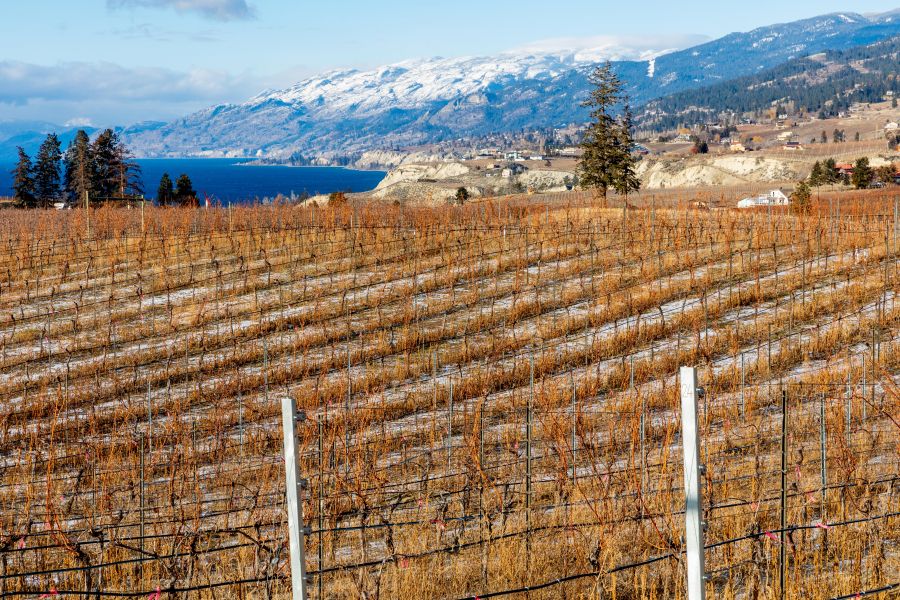
Now in the midst of the first cold snap of note since, Borren, who says his winery tries to keep a one-year inventory buffer, is not hugely concerned.
"I'm checking the weather all the time (through the Weather Network app) right now," he said, "and even though this is a long stretch of cold, the temperatures aren’t dropping low enough to kill vines.
"We're optimistic we get through this with a good crop."
He's also optimistic he'll see more visitors than in 2024, when Okanagan tourism seemingly fell victim to numerous factors, including a hangover from the questionably imposed late-2023 travel ban, overblown reports about stuff like rockslides, and erroneous rumours of cold snap-induced wine shortages.
"I just hope people come and find us this year," he said. "I think a lot of people missed out last year by not coming."
Matt Mikulic
Winemaker and Co-owner
Three Sisters Winery
Naramata Bench
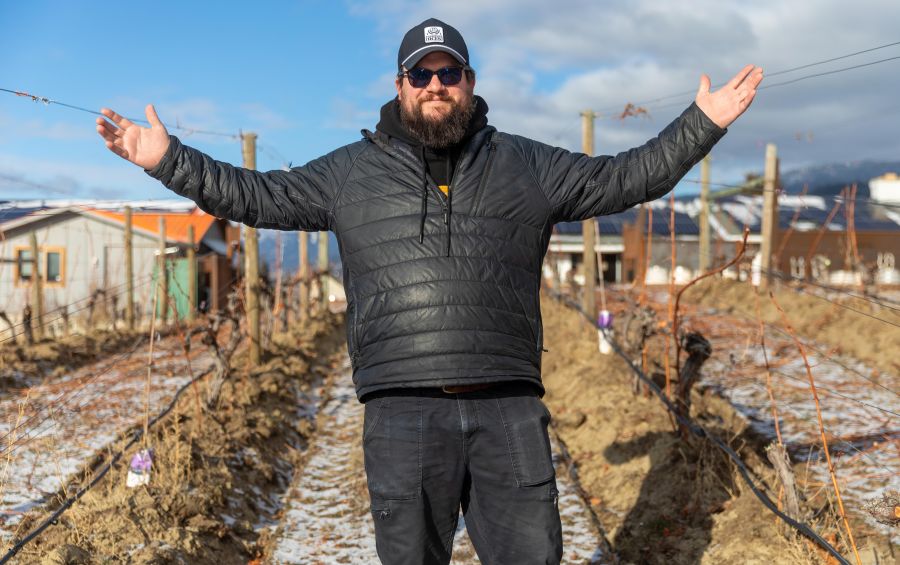
Just down the hill and about a kilometer and a half from Four Shadows is another numerically named Naramata Bench staple, Three Sisters Winery.
According to winemaker and co-owner Matt Mikulic, it was hit a wee bit harder in January of 2024 than its neighbor.
"We have four and half planted acres on the property," he explained. "And altogether we have just under 300 acres, from West Kelowna down to Osoyoos. We farm for other wineries as well and move most of that fruit on.
"But we lost virtually all of it in 2024. On that 300 aces, I think we got five or six tons of grapes in total. We've had 1800 tons in the past. So that's about a quarter percent.
"As for plants, we lost about one-eighth on the property here and across the board about 25 to 30 percent."
Mikulic worries about long-term repercussions too.
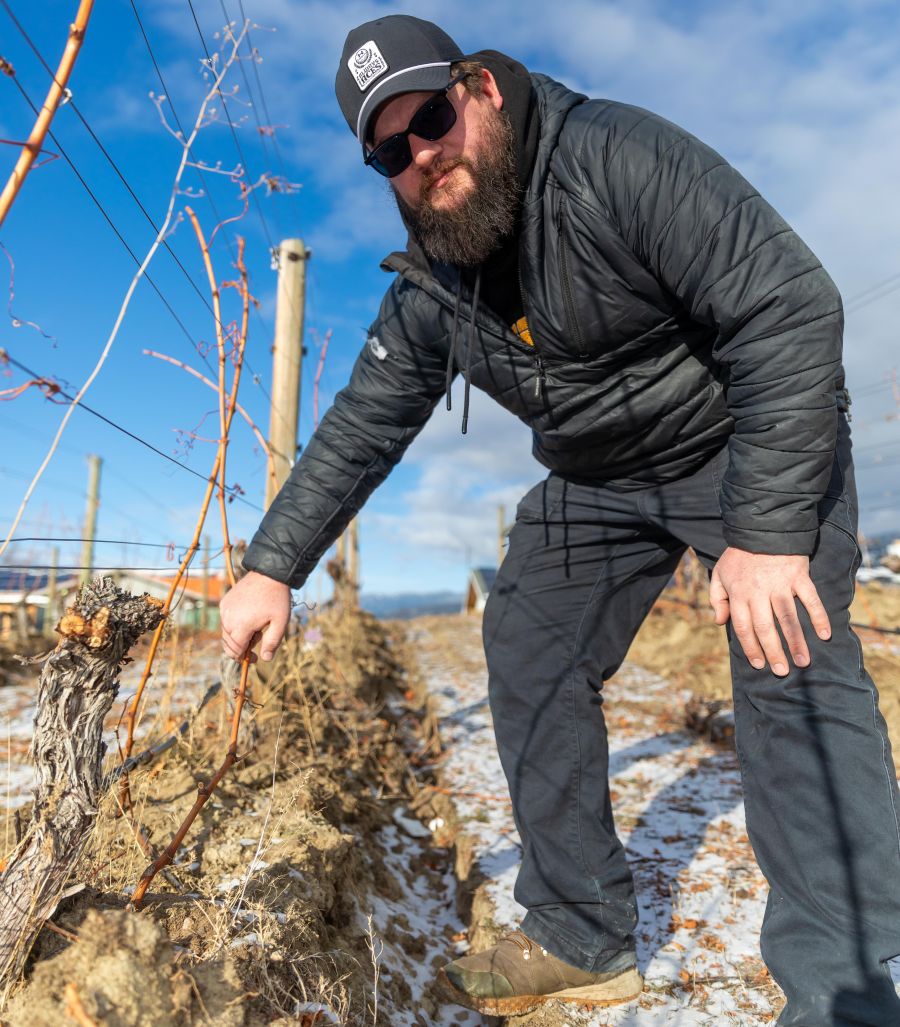
"There's a lot of damage to the trunks (of the surviving plants)," he said. "They may be fruitful for a couple years but then start to diminish over time."
And he's definitely concerned about the current cold snap.
"Absolutely I am," he said. "I don’t think it'll get as cold as it did last year, but we’re watching closely. At minus 20 I really get worried.
"And this is all pretty new. We've had instances like this only in the past two years – in January of '24 and December of '22. Before that I hadn’t seen this."
Mikulic isn’t sure if cyclical weather patterns or climate change – or both – is to blame. But he's certain the industry is getting tougher.
"There are temperature fluctuations," he said. "The old-timers say it happened in the 60s and then in the 90s and now in the 2020s. So maybe it’s a 30-year cycle.
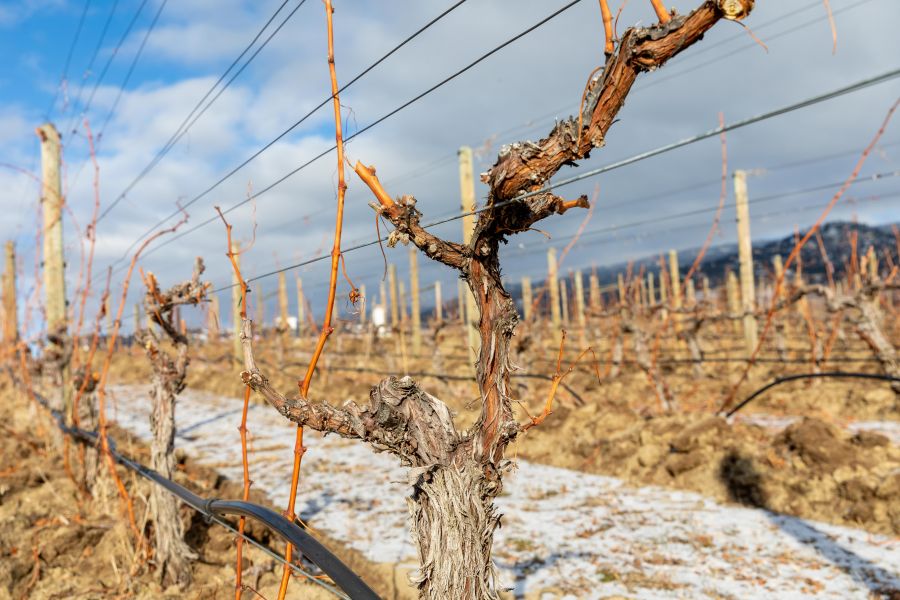
"But I think with any grape right now there's a risk of putting it in the ground. Not only the cold of the winter but the heat of the summer too. Even the hardy varietals were impacted with the last event.
"And as the popularity of BC wines has grown, people have been pushing the boundaries of where they're planting. So you just have to roll the dice. If you want to plant grapes, you have to live with the consequences of Mother Nature."
According to Mikulic, some varieties begin accruing damage at -18°C. Others may not be impacted 'til -26. Last year, he said, it was Syrah that took the hardest hit in the South Okanagan.
"And it doesn't take long," he added. "It depends on the variety. An hour, a couple hours, six hours – it doesn’t take long to burn those buds off."
Like Blasted Church, Three Sisters practices the preventative art of "hilling," where dirt is pushed up over the bottom buds in the late fall to insulate them.
More modern concepts, like geotextiles, are also being explored. But the costs are prohibitive.
"It can be upwards of $15,000 an acre to put that stuff in," said Mikulic. "It's a lot cheaper than replanting a vineyard, but what happens if you don’t have to use it for 30 years?
"So everyone is facing decisions."
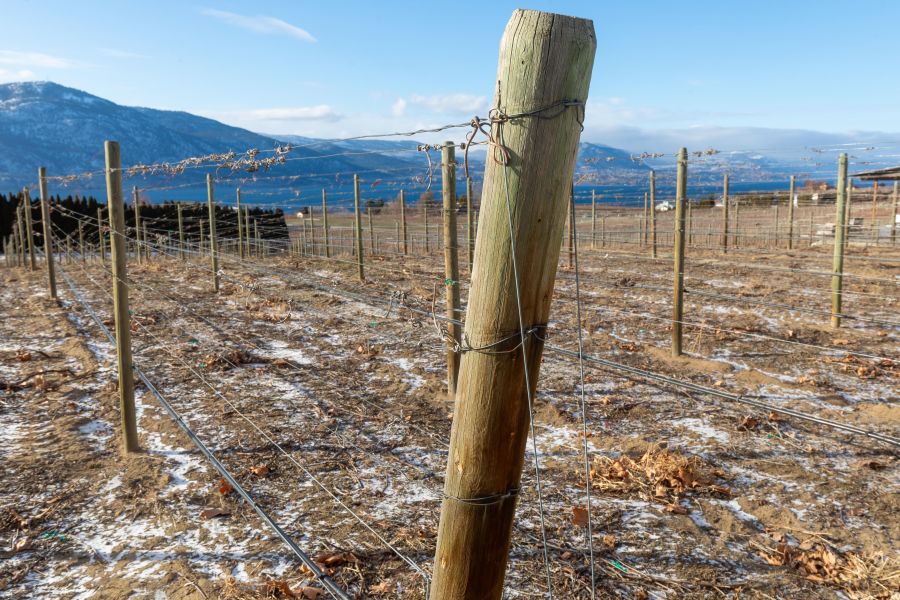
Adding further pressure is the Three Sisters inventory. Simply, there isn’t much of one. So interruptions in the flow aren’t particularly desirable.
"We run on a year to year basis," said Mikulic. "We try to sell out of our product before the next year."
As the next few days unfold, Mikulic hopes there's no significant downward deviation from the current forecast.
"Even a degree can save your vineyard," he said.
And, like all three winemakers who chatted with us, he believes there was some overreaction during and after the January 2024 event.
"We do have wines here," he said with a smile. "We do have wines to sell. Come and visit us."

A good time to do that in the immediate future, at least on the Naramata Bench, is during the second annual "Big Hearts Small Bites" event this coming Saturday, Feb 15. Thirteen area wineries are partaking. For more info, head here.



























